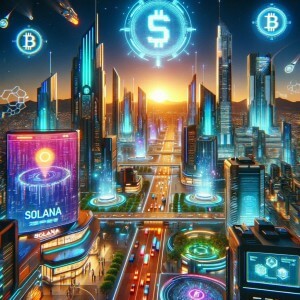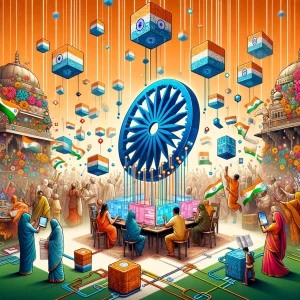The word “metaverse” was coined by legendary science fiction author Neal Stephenson back in 1992. In his book Snow Crash, he described a future where humans live inside a massive 3D computer network and interact with each other using avatars.
Stephenson proposed a metaverse within our own world, but they were tied together. Actions in the alternate version of the world would impact this one, and vice versa.
This idea has intrigued people ever since, inspiring countless variations on the theme over the years. But most had one thing in common: They were all centralized, which means that one entity could control the metaverse and everything in it, including people’s virtual identities, and even erase them.
The Blockchain Metaverse
That changed in 2013 when Ethereum founder Vitalik Buterin published a white paper proposing what’s now commonly called a “world computer” — with digital interactions based on distributed blockchain technology rather than conventional centralized servers.
Besides enabling applications like decentralized finance and transparent voting, Ethereum enables decentralized metaverses like Next Earth.
Instead of having just one server hosting simulated worlds, this new model allows anyone, anywhere to truly own their virtual assets and identity, without fear of centralized censorship or seizure.
Why are Decentralized Metaverses Better?
Decentralized systems don’t have any single point of failure. They can be copied onto different computers at any time without having to rely on an external server.
In addition, because all transactions are recorded on the ledger, it becomes much easier for users to verify each other’s identities and histories. That makes them less vulnerable to impersonation fraud or identity theft than centralized platforms can be since there is no central authority with which they can share information about users.
Finally, because everything happens through the network rather than being managed by one specific entity, there is no single point at which someone could threaten the system (as resulted from DDoS attacks against the likes of Google, Amazon, and GitHub).
Decentralized platforms also make it much easier for people around the world who live under repressive regimes to stay connected with friends and family.
Next Earth vs. Earth2 vs. Facebook
We’ve explored why decentralized metaverses are better than centralized metaverses: In a decentralized metaverse, you truly own your virtual assets and identity. Now, let’s look at a few examples: Next Earth vs. Facebook vs. Earth2.
Next Earth is a virtual world owned by its users. It was built from the ground up to be a self-contained, fully decentralized platform. Facebook owns the user data from their products (including your social profile, WhatsApp, and Instagram accounts). This will expand to Facebook’s newest metaverse. Even if Facebook calls the metaverse “decentralized,” it’s a different concept from “decentralization” through the lens of blockchain, as Facebook is a centralized governing body.
Next Earth is different because it’s owned by its users. You are in complete control over your assets and identity. This means you can build whatever you want without asking anyone else for permission first. Moreover, you’re automatically rewarded for community contribution.
Crucially, the additional features on-top of Next Earth land tiles, such as land art, are tokenized as non-fungible assets on the blockchain. This means that pixel-based land art created on Next Earth isn’t just another digital file: It’s a provably scarce, one-of-a-kind, unique artwork.
This level of freedom can spark incredible creativity within the community that will only grow as more people get involved.
The Dystopia of Centralized Metaverses
If we have a future where all our intimate data, and even cyber identities, is stored on centralized servers owned by corporations, how might they use (and abuse) that power?
In a centralized system, there are no trustless relationships: The users need to trust in a centralized server without any computational guarantees, transparency, or self-ownership. There are many problems inherent in this kind of system: Security holes could allow hackers or governments access to personal information stored on servers; and users could lose privacy because they don’t control their own data.
Instead of going down the dark path of centralized metaverses, it’s up to users to adopt decentralized metaverses where they truly own their own data. The choice is clear.





